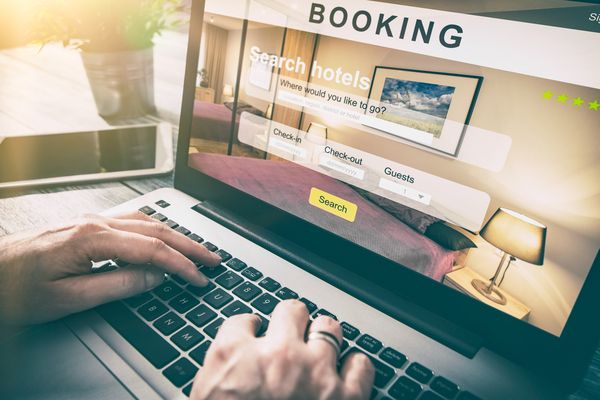Expedia (EXPE 0.90%) has been working to integrate VRBO into the rest of its websites. That's a short-term drag on earnings that may pay off in the long term. VRBO rents out private residences and offers consumers alternatives to traditional hotel rooms. That's a growing market that may have some short-term stumbles as various locales figure out how to regulate this type of housing. That makes the shorter-term prospects for this stock a little bleak, and the long-term trend toward hotels and airlines that have direct relationships with consumers may be a long-term drag.
In this segment of Industry Focus: Consumer Goods, host Shannon Jones talks with guest Dan Kline about VRBO in the context of Expedia. To catch full episodes of all The Motley Fool's free podcasts, check out our podcast center. A full transcript follows the video.
This video was recorded on Aug. 20, 2019.
Shannon Jones: What we saw even in that home rental segment, they are still struggling. There's concerns, especially with competition like Airbnb out there. And then also, listening to the conference call, there was a decision to streamline a lot of its brands to further emphasize VRBO. I think that will likely hurt the stock in the short term, although I do think over the long term, it makes sense to put more emphasis, especially when it comes to SEO, and getting an optimized ranking on Google Sites, because Google is both friend and foe in this space. So, I think, short-term headwinds for Expedia, but long-term, their renewed focus in this space makes sense.
Dan Kline: Yeah, and there's a short-term, let's call it legislative problem. The whole concept of renting out your home for a short-term basis has been dealt with in a lot of tourist markets, or some of the bigger cities, but the vast majority of the country still has to decide how it's going to handle it. I know that in my building -- I live in downtown West Palm Beach, Florida -- you are only allowed to rent your property 11 times a year, and it has to be for at least a month. Some people rent for shorter terms and find clever ways around it by writing the lease for a month; and some people just flaunt the rules. That's going to become an issue. There's going to be taxation, there's going to be pushback from hotels. And for the next two or three years, I expect there to be a little bit of instability in that business as you see certain cities crack down, certain cities lighten up. But, that is all going to get worked out, largely because you can see where the economy is going. We're past the point where this whole gig economy -- and Airbnb and VRBO fit into that, with an individual renting out their home to make extra money, for the most part. That's all going to happen. So, the near-term outlook is maybe a little bit uneven for that business. The three to five-year outlook is that this is going to be a growth area, and Expedia owns one of the two names that matters in the space.
Jones: Yeah. That entire segment -- houses, apartments, non-hotel-like properties -- make up about 20% of all accommodations out there. You could see this certainly gaining traction over time. You made a great point about the regulatory landscape. Very similar to with Uber and Lyft. They're plowing ahead, and regulations then have to catch up. So I think, yeah, in the short term, you're going to continue to see some headwinds there.
Dan, if you had to pick as an investor between Booking Holdings and Expedia, which would you say is your top pick?
Kline: I'm going to go and point out that I wouldn't invest in either for the reason I spoke of before. I think every brand that I'm regularly a customer of is going to figure out how to have a direct relationship with me. That is going to cut away some of my business from third-party booking services. If I had to pick, I believe in the Priceline branding more than I believe in the Expedia travel agent model. I think people want a deal, and I don't think the core Expedia offering offers a deal. There's convenience, and it's a very good product, the technology is great, but Priceline is somewhat of that lottery, where you might save a lot of money. And just for that reason, I'd be more inclined to do that. But honestly, I wouldn't invest in either one.
Jones: Yeah, I can see the argument on both sides. I think if I had to choose one, it would probably be booking.com. I think that massive global presence -- granted, it's no longer a growth story. There's not a growth story for Expedia, either, right now. But I think that massive European presence, and their partnerships that they're making with OTAs in China, as well, are intriguing to me. I think, as Booking tries to strengthen its network effects through acquisitions, and really trying to stand up a lot of these other verticals that they're going after, the concern for me is, with so many different brands -- this even applies to Expedia -- how do they make sure that they stay focused? At one point, Booking was even into mortgages, they were doing gas. I do worry about that over time. But I'd say, just given the size and the scale, and having that, especially when you're competing with the likes of Google and Amazon, I would probably give the hat tip to Booking.
Kline: To give a last thought, we mentioned Open Table. Booking owns Open Table, which is a restaurant reservation service. They make money by the restaurants paying them, I don't know if it's per booking or there's a monthly fee, but it's a different model. What they've been doing recently is integrating Open Table into Priceline. Probably other services as well, but I've seen it at Priceline. So when you go in to look at your hotel room, you have a button right there that says, "show nearby restaurants." And it shows them in Open Table. And you can very easily make a reservation. It takes some of the guesswork out of, "Gee, how far from my hotel is that restaurant?" And you can see that becoming a platform, where it integrates across a lot more areas, that gives an added value to what Priceline, what booking.com, what all their other services are doing in general. It's kind of an outlier of a product, but it actually strengthens the whole brand. And frankly, it makes a lot more sense than being the Priceline of mortgages, which I think they were at one point.
Jones: Yeah, totally true. And, they're also doing this attractions business, where they're trying to generate some revenue off of some of the activities and tours and things that you do when you go to some of these cities. They're certainly trying. Again, this is not a growth story. I think, if you're an investor, as long as you recognize, this isn't really a growth story right now, it's going to be slow-going. But all in all, I think staying away until we get a better idea of what is going to happen on the competitive landscape makes the most sense.





